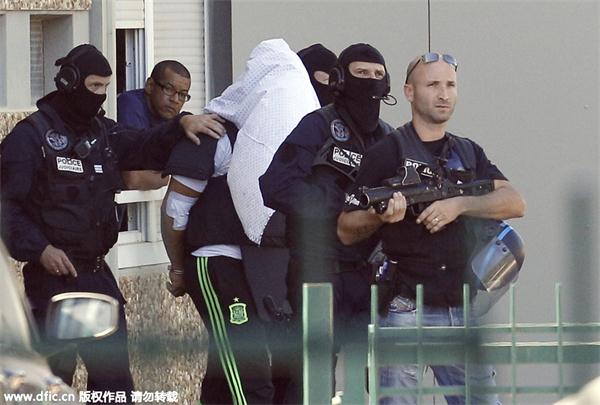Substantial aid to fight against IS badly needed
(China Daily) Updated: 2015-06-29 07:50
 |
|
The suspect in the beheading of a businessman, Yassine Salhi, a towel over his head to mask his face, is escorted by police officers as they leave his home in Saint-Priest, outside the city of Lyon, central France, Sunday, June 28, 2015. A security official tells The Associated Press the move to his home aims to find his passport, to determine if he traveled abroad. The suspect allegedly crashed a truck into a U.S.-owned chemical warehouse on Friday, setting off an explosion, and hung his employer's head on the factory's gate. [Photo/IC] |
In Asia, Africa, and Europe, at venues of relaxation, worship and work - should the suspected link between the extremists and the attack at the factory near Lyon, France, be confirmed - the three terrorist attacks on Friday, within hours of each other, delivered the shocking message that the Islamic State group can strike whoever, wherever, whenever they choose to.
Or at least so the extremist group would like people to believe.
They were quick to assume responsibility for the rampage in the Tunisian resort town of Sousse, which left 39 dead and dozens wounded, and the suicide bombing at the Imam Sadiq Mosque near Kuwait City, which killed 25 and injured more than 200. Even the attacker at the French factory left clues to a link with the Islamic terrorist group.
But subscribing to the IS claims without solid evidence is dangerous, because it reinforces the latter's extremist propaganda and inspires more to follow suit.
The IS propagandists are "sophisticated" and take advantage of contemporary information technology to spread their gospel of violence.
Just last week, they issued a call for followers to bring "calamity for infidels" during the Islamic holy month of Ramadan, which began on June 18.
If there is credible proof that the three attacks were not just coincidences, the international community has reason to worry about the devastating potential of IS. Even if they turn out to be "lone wolf" acts inspired by IS propaganda they are worrisome, since it difficult to forestall such attacks.
The culprits in the two deadliest Friday attacks have been identified as young students. That should serve as a reminder of the venomous poison of terrorist indoctrination.
Given the convoluted relationship with religious beliefs, and the less-than-perfect political, economic and cultural realities, the known breeding ground for inequality, hate and terrorism, it is no easy task to deal with the IS' hate-mongering.
But considering that the IS group has been rallying acolytes with battleground successes, the fight against IS will ultimately rest on battlefield successes against it.
The fight against the IS has thus far been ineffective, not because the extremist group is invincible, but because the government forces in Iraq and Syria are too weak, and the West too half-minded to deliver substantial assistance.
That other militant groups in the Middle East have begun "re-branding" themselves as part of the IS group is a development that requires serious countermeasures.
The IS with substantial allies, sphere of influence and global reach will be much bigger trouble for the West than Bashar Assad remaining president of Syria.











